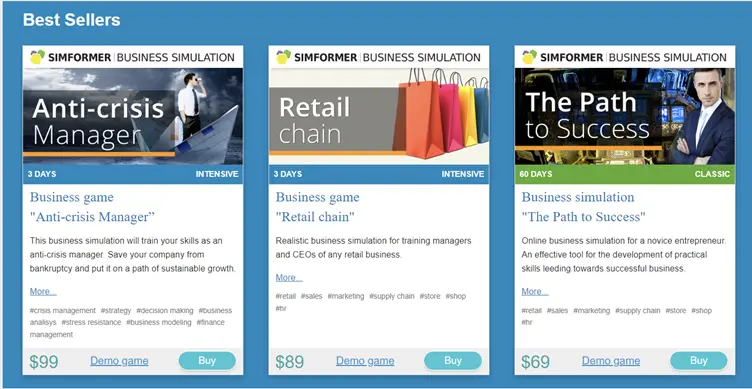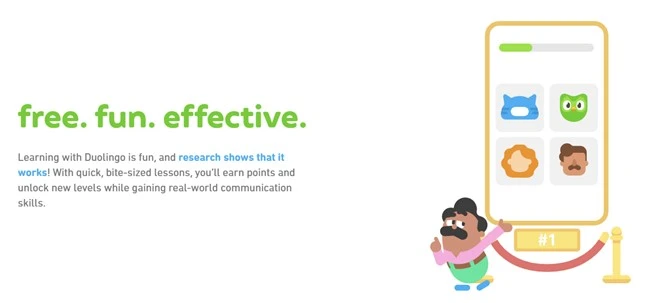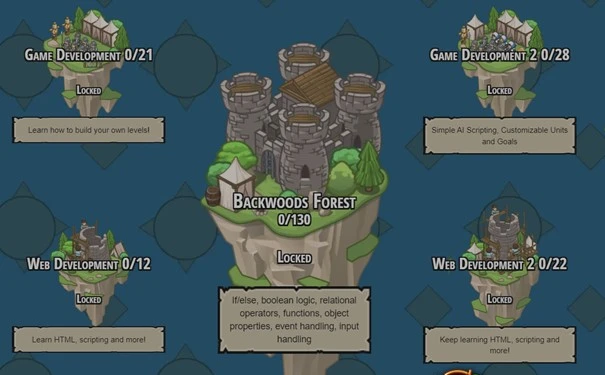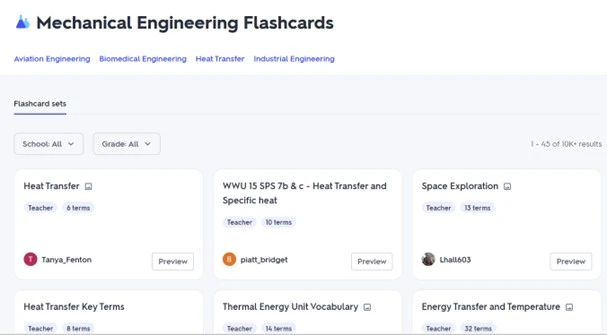Gamification for learning? What does that mean?
When you think of the words ‘training’, ‘upskilling’, or ‘professional development’, almost certainly you’re not collocating any of those with ‘fun’.
Usually, career-related learning involves long workshops, presentations, training courses, or theory-intensive online modules. For busy professionals, the time investment and lack of excitement associated with these types of learning can be, well, BORING.
If this sounds like you, then you’ll be thrilled to discover that skill development does not have to be this way.
Ever heard of Game-Based Learning (GBL)?
If you’ve tried Duolingo or Kahoot, you’ll know how much fun gaining knowledge can be if you do it through games versus traditional study methods. Instead of reading or listening then responding to formal assessments, gamification leverages entertaining activities, interactive elements, simulations, and/or competitiveness to engage and stimulate learners. If you’re entertained, and being instantly rewarded through points or climbing up a league table, you’re going to stay motivated to learn.
While online GBL has its origins in personal learning scenarios, such as individual language development, companies are rapidly catching on to the fact that their employees are more likely to engage with and retain learning if they’re actually (mild sarcasm alert) enjoying themselves.
As you’re already starting to agree, incorporating game-based learning into professional upskilling offers a much more engaging approach that traditional learning. In fact, GBL provides a range of benefits that contribute to a more impactful learning experience:
1. Increased Engagement
Games are inherently designed to be engaging and interactive. The use of game elements, such as challenges, rewards, and competition, captures the learner’s attention and encourages active (and regular) participation.
Higher engagement leads to better retention of information, increased motivation to learn, and a more enjoyable learning experience overall. Win-win.
2. Real-World Application
Game-based learning often simulates real-world scenarios and challenges. This allows users to apply theoretical knowledge to realistic situations, promoting the development of practical skills that can be directly transferred to their job roles.
What’s more, learners gain hands-on experience in a risk-free environment, improving their problem-solving abilities and preparing them for real-world challenges.
3. Instantaneous Feedback
Games provide instant feedback on performance. Learners receive feedback on their decisions and actions immediately, allowing them to understand the consequences of their choices in real-time.
Immediate feedback facilitates a continuous learning cycle, enabling professionals to identify areas for improvement and make necessary adjustments. They also have the ability to retake the exercise and instantly achieve better points or a higher position on a league table, which motivates them to push on to the next level of learning.
4. Collaboration and Team Building
Many GBL platforms incorporate collaborative elements, encouraging learners to work together to achieve common goals. This fosters teamwork, communication, and collaboration skills.
By learning to work more effectively in teams, users foster a collaborative mindset that is crucial for success in many professional settings.
5. Adaptability and Flexibility
High on the list of benefits is that GBL typically allows learners to progress at their own pace and choose their own learning path. It provides a flexible and adaptable learning environment that accommodates various learning styles and preferences. GBL is often available in several languages, making it more accessible than many traditional learning formats.
Professionals can tailor their learning experience to meet their specific needs, ensuring that the upskilling process is efficient and personalized to their individual learning preferences.
Sounds great! So - what game-based platforms can I use to upskill for my career?
While there are dozens (if not hundreds) of game-based platforms out there for businesses, in this blog post we’ll share 5 platforms that can be signed up to by individual learners. Some are free; others require a monthly subscription or payment for certifications.
Let’s take a look.
Simformer (Business Skills | Industry Knowledge)
Simformer’s aim is to make business education a fascinating process. It draws upon experiential sim-based training to enhance your business skills. Choose business simulation training in areas such as production, operations, logistics, marketing, sales, and service. Explore engaging simulations in firm infrastructure, HR management, technology development, and financial management.

Duolingo (Foreign Languages | Foundational Maths)
In our increasingly international business world, understanding at least the basics of another language can be hugely beneficial in your current or future jobs. Duolingo offers GBL courses in over 40 languages, ranging from English, French, and Spanish to less commonly studied languages such as Welsh, Irish, and Swahili.
Duolingo has expanded its learning offerings to include maths, and is currently testing a foundational music program as well.

CodeCombat (Programming)
CodeCombat is a computer science platform that teaches coding and AI skills through the power of play. CodeCombat draws on hundreds of players volunteering to create levels, contribute to its code to add features, fix bugs, playtest, and even translate the game into 50 languages. Its custom code engine and interpreter is designed for beginners, teaching true Python, JavaScript, and C++ programming languages using human, beginner-friendly terms.

Quizlet
Quizlet is a global learning platform that utilizes practice tests, digital flashcards, and AI-powered tools to make the gaining of subject knowledge more enjoyable. While Quizlet is more commonly used by schools and universities, individual learners can tap into subjects including languages, specific maths concepts, sciences, engineering, social sciences, and computer skills.
Quizlet primarily helps you recall information through flashcards and quiz-style assessments. Individuals can also generate their own study sets and assess their knowledge. Additionally, they can explore a vast database containing millions of study sets created by other users, ranging from single users to institutions.

GoSkills (Business Skills | Software Programs)
GoSkills uses a blend of microlearning and gamification to help learners gain and retain information faster. Its gamification features incorporate coins, badges, levels, and streaks.
Some of its more popular business skills courses include programs from the Microsoft Office and Adobe suites, Lean Six Sigma Green Belt modules, finance fundamentals, project management, leadership & management, office productivity, design, data analysis, and soft skills. Certificates are also available for completed courses.

Conclusion
Game-based learning for professional upskilling has lots of advantages. Its inherent engagement techniques foster a dynamic and interactive learning experience, leading to increased motivation and better retention of information.
That doesn’t mean that more traditional methods should be thrown out the window, however. Depending on the educational purpose and formality, traditional methods may not just be more appropriate, but more effective too (e.g. university courses or professional qualifications). But when it comes to upskilling and subject knowledge acquisition, GBL has a huge number of benefits.
The simulation of real-world scenarios allows professionals to apply theoretical knowledge practically, with immediate feedback on their decisions. Collaboration and teamwork are encouraged, promoting better interpersonal skills. Not only that, but the adaptability of game-based learning caters to diverse learning styles, ensuring a personalized and efficient upskilling process.
Overall, these benefits contribute to a more effective, enjoyable, and impactful professional development journey.
Do you know of any other game-based platforms for individual professional learners? Let us know in the comments!
Key takeaways
-
Instead of formal learning, game-based learning (GBL) leverages entertaining activities, interactive elements, simulations, and/or competitiveness to engage and stimulate users
-
GBL incorporates elements such as the ability to gain points, earn achievements, or climb a league table to motivate and reward learners
-
Benefits of GBL include increased engagement, real-world application, instantaneous feedback, collaboration and team building, and adaptability and flexibility
-
Popular game-based platforms for individual upskilling include Simformer, Duolingo, CodeCombat, Quizlet, and GoSkills
-
Game-based learning for professional upskilling has been proven to contribute to a more effective, enjoyable, and impactful professional development journey
For more insights, tips and strategies related to this topic, be sure to read our other articles: 5 Successful Upskilling Strategies for Career Pivoting & Soft Skills vs. Hard Skills - What’s the Difference? (With Examples) & 6 Effective Methods to Learn and Upskill While Sleeping
Related questions
What are some examples of gamification techniques used in professional training?
Gamification in professional training often includes elements like points, badges, and leaderboards to motivate learners. Interactive challenges, quizzes, and simulations that mimic real-world scenarios are commonly used to enhance engagement. By incorporating levels and rewards, learners are encouraged to complete tasks and stay committed to their learning journey.
How can gamification improve retention rates in e-learning?
Gamification improves retention rates by making learning more interactive and enjoyable, which keeps learners engaged. Elements like instant feedback, challenges, and rewards create a sense of accomplishment and motivation. By tapping into the natural human desire for achievement and competition, gamified learning encourages learners to revisit and retain information more effectively.
Can gamification be tailored to different learning styles?
Yes, gamification can be tailored to suit various learning styles by incorporating different types of activities, such as visual simulations, interactive storytelling, or collaborative games. Adaptive learning paths can be created to match individual preferences, ensuring that each learner engages with the content in a way that best suits their style. This flexibility helps cater to diverse needs, enhancing the learning experience.
Explore more articles
- US Remote Work Statistics and Trends [2026 Study]
- Digital Nomad Guide - Top Jobs, Benefits & Best Places for 2025
- Employment Contract Explained: What Key Clauses Mean
- How to Spot and Avoid WhatsApp Scams & Online Fraud
- Stressed? Try These (Secret) Mindfulness and Meditation Techniques
- It's Not Up To Your Boss: Why Upskilling Is YOUR Responsibility!
- It's Not You, It's Them: How to Handle Workplace Bullies
- What Are Group and Panel Interviews and How to Ace Them!
- Decoding Job Descriptions: Here’s What Employers REALLY Want!
- Eyeing A New Job? How to Fix Job Skills Gaps BEFORE You Apply!
